#Punctuation & Spelling - Paper 2
Explore tagged Tumblr posts
Text

2024 National Curriculum Tests
Key stage 2
English grammar,
punctuation and spelling
test mark schemes
Paper 1 : questions
Paper 2 : spelling
#2024 National Curriculum Tests#Key stage 2#English#SATs#Year6#SATs2024#Grammar#Punctuation & Spelling - Paper 1#Punctuation & Spelling - Paper 2#English Reading
2 notes
·
View notes
Text
actual writing advice
1. Use the passive voice.
What? What are you talking about, “don’t use the passive voice”? Are you feeling okay? Who told you that? Come on, let’s you and me go to their house and beat them with golf clubs. It’s just grammar. English is full of grammar: you should go ahead and use all of it whenever you want, on account of English is the language you’re writing in.
2. Use adverbs.
Now hang on. What are you even saying to me? Don’t use adverbs? My guy, that is an entire part of speech. That’s, like—that’s gotta be at least 20% of the dictionary. I don’t know who told you not to use adverbs, but you should definitely throw them into the Columbia river.
3. There’s no such thing as “filler”.
Buddy, “filler” is what we called the episodes of Dragon Ball Z where Goku wasn’t blasting Frieza because the anime was in production before Akira Toriyama had written the part where Goku blasts Frieza. Outside of this extremely specific context, “filler” does not exist. Just because a scene wouldn’t make it into the Wikipedia synopsis of your story’s plot doesn’t mean it isn’t important to your story. This is why “plot” and “story” are different words!
4. okay, now that I’ve snared you in my trap—and I know you don’t want to hear this—but orthography actually does kind of matter
First of all, a lot of what you think of as “grammar” is actually orthography. Should I put a comma here? How do I spell this word in this context? These are questions of orthography (which is a fancy Greek word meaning “correct-writing”). In fact, most of the “grammar questions” you’ll see posted online pertain to orthography; this number probably doubles in spaces for writers specifically.
If you’re a native speaker of English, your grammar is probably flawless and unremarkable for the purposes of writing prose. Instead, orthography refers to the set rules governing spelling, punctuation, and whitespace. There are a few things you should know about orthography:
English has no single orthography. You already know spelling and punctuation differ from country to country, but did you know it can even differ from publisher to publisher? Some newspapers will set parenthetical statements apart with em dashes—like this, with no spaces—while others will use slightly shorter dashes – like this, with spaces – to name just one example.
Orthography is boring, and nobody cares about it or knows what it is. For most readers, orthography is “invisible”. Readers pay attention to the words on a page, not the paper itself; in much the same way, readers pay attention to the meaning of a text and not the orthography, which exists only to convey that meaning.
That doesn’t mean it’s not important. Actually, that means it’s of the utmost importance. Because orthography can only be invisible if it meets the reader’s expectations.
You need to learn how to format dialogue into paragraphs. You need to learn when to end a quote with a comma versus a period. You need to learn how to use apostrophes, colons and semicolons. You need to learn these things not so you can win meaningless brownie points from your English teacher for having “Good Grammar”, but so that your prose looks like other prose the reader has consumed.
If you printed a novel on purple paper, you’d have the reader wondering: why purple? Then they’d be focusing on the paper and not the words on it. And you probably don’t want that! So it goes with orthography: whenever you deviate from standard practices, you force the reader to work out in their head whether that deviation was intentional or a mistake. Too much of that can destroy the flow of reading and prevent the reader from getting immersed.
You may chafe at this idea. You may think these “rules” are confusing and arbitrary. You’re correct to think that. They’re made the fuck up! What matters is that they were made the fuck up collaboratively, by thousands of writers over hundreds of years. Whether you like it or not, you are part of that collaboration: you’re not the first person to write prose, and you can’t expect yours to be the first prose your readers have ever read.
That doesn’t mean “never break the rules”, mind you. Once you’ve gotten comfortable with English orthography, then you are free to break it as you please. Knowing what’s expected gives you the power to do unexpected things on purpose. And that’s the really cool shit.
5. You’re allowed to say the boobs were big if the story is about how big the boobs were
Nobody is saying this. Only I am brave enough to say it.
Well, bye!
4K notes
·
View notes
Text
Advice On Writing
I have a couple of writing friends who keep asking me for advice (which is extremely flattering and I love to infodump, please don't stop), but I thought getting my thoughts down on the metaphorical paper and putting them out into the world might be helpful for others as well.
I mostly had fanfiction in mind when I wrote this, but honestly I think the vast majority of it will be applicable to any kind of creative writing.
I would love to get feedback or have conversations about this, so if you want to squawk at or with me, please don't hesitate!
The Bare Minimum
Write
Write as often and as much as you can. If you manage to do nothing else on this list, just writing consistently and continuously will eventually improve your skills, even if it takes a long time.
The Basics
2. Read
Find things you enjoy, and read them. Read as much as you have time for. Things that speak to you and make you feel things (words, turns of phrase, tropes) will all work their way into your subconscious and feed your own writing.
3. Read Critically
Re-read the things you enjoy, and consciously think about why you enjoy them. Why did this scene manage to express such a clear sense of desolation? What about this interaction between characters made me relate to them so much? How did this story give me such a sense of satisfaction and coming full circle? Highlight the phrases you really love. Look for and circle the small details that foreshadow later developments. Identify the things you don’t like as well (nothing is perfect). How would you have done this differently? Do you hate the purple prose, or is it killing you that these scenes aren’t more detailed? Look up the words you don’t understand - maybe the author chose their words poorly, or maybe you’re one of the lucky ten thousand who gets to learn a new vocabulary word today.
The Cringe Parts
4. Ask for constructive criticism
This part is really hard, but vital. While you will inevitably find some of the weaknesses of your own writing, you won’t find all of them. An outside perspective is invaluable. If you’re frightened of constructive criticism, start small. Ask one person to look at SPAG (spelling, punctuation, and grammar). Pick one paragraph or scene to show someone and ask them how it flows. Have someone review your outline for plotholes instead of giving them prose. Brace yourself for things you don’t want to hear. Sit with any and all criticism for a few days before reacting. It’s okay to decide that someone just didn’t get what you were going for, but make sure that’s actually true instead of just a knee-jerk reaction to hurt feelings or a bruised ego. Listen to what your reviewer or beta is actually saying - ‘this part confuses me’ doesn’t mean your writing is bad, it means that your head holds the entire picture and you just didn’t put enough of that down on paper so your reader can see it too.
5. Re-read your own work
Every once in a while, go back and see how what you wrote six months ago or last year holds up. You’ve been writing for a while, you’re a stronger writer, so give yourself the perspective of seeing how far you’ve come. And see if there are any weak areas that are still giving you trouble; you can focus more on those in your next piece of writing.
6. Edit for other people
Editing is a skill. No one falls out of the sky able to give useful and actionable feedback. The act of reading and criticising something you have a little cognitive distance from is far easier than criticising your own work, but it’s still a muscle you need to build. Start with basic proof reading (SPAG). Ask questions: “Why did you choose this word, it seems obscure?” Explain your feedback: “I can’t tell who’s speaking here, I think the dialogue went back and forth one too many times without a tag.” Instead of “I don’t like this,” explain why: “This description feels like something I’ve seen too many times already and feel cliché, but I bet you can change it up.” Learning to give that feedback in a kind and helpful way is something you can bring back to your own writing. Remember that if someone asks you to beta read or edit their work, they too are trying to get better. Don’t just blow sunshine up their ass, give them the respect of being honest about elements that aren’t working. Just don’t be an asshole about it.
Some resources on being a good beta reader - these also are handy guides for writers on how to communicate their needs effectively to a beta reader:
How to Be a Great Beta Reader and Give Helpful Feedback (dianaurban.com)
What makes a good beta reader? (smallbluedog.com)
Tips on how to beta read, from a beta reader : FanFiction (reddit.com)
Advanced Class
7. Try new things
Try a different format. If you mostly write long, multi-chapter works, aim for a short story. Write some poetry. Change up your genre. Consciously try to imitate someone else’s style. Stretch out of your comfort zone. Feel like you write too much descriptive detail? Force yourself to write nothing but dialogue, like Isaac Asimov. Feel like your characters are always floating in empty space? Indulge in some Robert Jordan, down to every detail of what the characters are wearing. This is going to be difficult, and the results might not be something you want to share publicly, but it’s still worth the effort.
8. Read about writing
There are university courses on this stuff. Check your local library for a copy of the Little, Brown Handbook - it’s aimed at academic writing, but it’s a great resource on grammar and syntax and planning and revising your work. Look for fun ones like The Transitive Vampire and The Well-Tempered Sentence, or Eats, Shoots & Leaves. Centre for Fiction has a great list of books on creative writing by writers, and industry professionals (if publishing for profit is a goal of yours).
Back to the Beginning
9. Keep writing
You might not be the next Stephen King, or Jude Devereaux, or Isaac Asimov. Cool, me neither. You don’t have to be. As long as writing is still giving you joy, keep doing it.
104 notes
·
View notes
Text
Incomeless; will proofread your fics! (Or anything else.)
I'm not sure how to head this with a snazzy, attention-catching image given I'm not offering an obviously graphic service like art commissions, but let's give it a go...
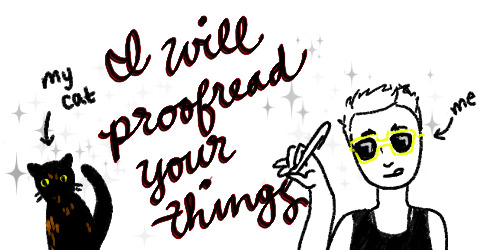
Hello, I'm your friendly neighborhood disabled unemployed transgender queer on the internet. I have not posted a great amount about the details on this blog for privacy reasons, but I am currently in an untenable familial/financial living situation, which I am actively working to get out of. My primary barrier to disentangling myself from the pertinent parties is a lack of income. I've been unable to pursue traditional means of work due to being multiply disabled (slash chronically ill, slash treatment-resistant, et cetera...), but I do not qualify for SSI or unemployment, so I am stuck trying to find other ways of making money.
This is where you come in... If you'd like to help, you can:
$$ Hire me $$ to proofread your fics, essays, and more!
Click below for info! (I also may add separate posts for diversity reading and/or other writing- and editing-related services.)
For $0.00855/word *OR BEST BID*, I will vet your work of writing before you publish it, checking for mistakes in spelling, capitalization, & punctuation, missed words, inconsistencies of tense, formatting, & POV, and miscellaneous grammatical errors. Never again need you fear posting a finished chapter and discovering a slew of typos after the fact; no matter how sleep-deprived or late at night the state of writing, I will ensure your text is ship-shape. Or, if you happen to be interested in having other types of writing proofread before submission--essays, comics or webtoons, letters, transcripts, compositions of a personal nature, so on--I will happily take these on at a comparable rate.[1]
Qualifications:
Bachelor's degree in English with a minor in writing
Initiate of international collegiate honors society for English scholarship, Sigma Tau Delta
Active member of the International Association of Professional Writers and Editors (IAPWE)
Former lit editor for award-winning university literary arts magazine
Prior employment in tutoring and teaching English, as well as copy-editing and content writing
Nearly 20 years' writing experience
Previous experience as both fic writer and beta
Incisive eye for typo-hunting and tenacious attention to detail (I have high standards and will make those everybody else's problem... now for pay!)
I will read for content of any genre and all ratings, and am broadly[2] open to any subject matter, kinks, et cetera. I'll also post more detailed guidelines (booking process, any exclusions, additional criteria) on a separate, unrebloggable post so that any edits and updates are always current.
Message me via the chat feature on Tumblr, or send me an e-mail (I will post it on my more info post) to request a quote, bid for a slot, or just to see what I can offer for whatever project you have in mind. And please feel encouraged to share or boost this post! I am in urgent need of any income I can get, and every share counts 😭🙌
. . . . . . . . . .
Proofreading Full Details · Other Services · Support Me (alternatively, Tip this post!)
- - - - - - - - - - - - -
[1] There will be some exclusions to this, such as academic assignments/papers that have style guide requirements; i.e., I will not be your online MLA style checker or anything.
[2] As with anything, there will be sporadic exceptions to this as well, but I will always be up-front about such cases.
#proofreading#fanfic#writing help#for hire#authblr#ficblr#writers on tumblr#writeblr#other tags??? idk help me out here#proofreading post#this is tumblr let's all pretend this post is as professional as it gets and that i don't have any obsessive compulsive disorders at all
70 notes
·
View notes
Text
My unpopular opinion of the day is that grammar correcting AI isn't inherently bad.
Like, specifically AI (or just... Machine learning systems) that help you with spelling of certain words and punctuation and grammar structures? They're not bad. Actually, they're extremely useful and can be considered an aid to many people, such as:
- dyslexic people
- English as Second Language people
- people with fine motor issues
- more
As well as being generally just useful to all of us. Sure, there are drawbacks such as students using them to cheat on leaning the grammar/spelling, but 1) cheating spelling has been a thing since the online dictionaries became a thing and banning them won't solve the issue 2) AI-checking grammar and spelling in essays or formal papers isn't an issue because they're barely graded on those things anyway, and frankly they shouldn't be.
The real issue with those AIs is that most of the information in their data banks 1) is obtained without consent, illegally and/or by scrapping 2) isn't double-checked by a real human being. Which makes its usage dubious at best and actually pretty dangerous at worst.
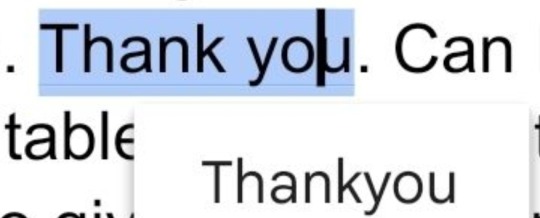
This little blunder google documents did to my writing in the example above is most likely the result of the following:
1) Some people writing thankyou and getting a pop up correction for "thank you"
2) Those people, for whatever reason may be, chose to keep their original spelling
3) This probably happened enough times that now Google AI most likely considers "thankyou" to be an alternative spelling of "thank you" that it wasn't aware of previously instead of a mistake
4) Because it's a system that lacks context and awareness, it will occasionally offer incorrect spelling over a correct one because it considers them mutually possible. It will also not flag an incorrect spelling, unless some other data overrides the rule.
This happened so many times for so many people that now Google Doc's corrections are considered unreliable even for common words, which would not have fucking happened if Google didn't train their AI on their users documents.
But ethically trained on the input of consenting users that is also double-checked by real people to not contain any intentional misleading AI can still exist and would be a very good tool to have. Alas...
#jay rambles about life.txt#sigh#saw the article that says that some educational facilities now flag ais that correct grammar mistakes as#the same as a student using generative ai and#it's. really not the same thing. at all
31 notes
·
View notes
Text
How to Write an Essay (Without Losing Your Sanity lol)
The essay. That dreaded form of writing that often brings out feelings of fear, dread, and confusion. But fear not! Writing an essay doesn't have to be as terrifying as it seems. Whether you're a student or someone who just got stuck with a writing assignment, i am here to guide you through the process. Get ready to unlock the mystery of essay writing in a very simple way.
Step 1: Understand the Prompt
First things first: Read the assignment. I know, I know—this sounds too easy, but you'd be surprised how many people skip this crucial step. Understanding the question you're being asked is the foundation of your entire essay. You wouldn’t build a house without a blueprint, would you? (Unless you’re a DIY enthusiast)
Ask yourself:
What is the essay asking me to do? Analyze? Argue? Explain?)
Are there specific guidelines or requirements? (Word count? Format? Citation style?)
What’s the purpose of the essay? (Are you informing? Persuading? Telling a story?)
Step 2: Research Like You’re the Next Sherlock Holmes
You may be tempted to skip this part and just write whatever comes to mind. Big mistake! Essays are all about backing up your ideas with solid evidence. So, channel your inner Sherlock Holmes and start researching.
Use reliable sources (we’re not citing Wikipedia here, folks).
Take notes and organize your thoughts. This will save you from diving into a writing frenzy and realizing halfway through that you’ve completely lost track of your argument.
Look for a variety of sources—books, articles, interviews, or anything that feels appropriate for your topic.
Once you’ve done your research, take a deep breath and let the facts fill your brain. You’ll need them in the next step.
Step 3: Make an Outline
Okay, you’ve got your research, and now it’s time to plan out your essay. The outline is like a map that keeps you from wandering into the unknown wilderness of “I don’t know what I’m doing anymore.”
There are different ways but this is how I make the most simple outline for my essay
Introduction: This is where you grab your reader's attention. Start with a hook—something that piques curiosity or makes them think. A quote, a question, or even a joke (that’s relevant, of course).
Body Paragraphs: These are the meat of your essay. Each paragraph should cover one main idea. Start with a topic sentence, support it with evidence, and wrap it up with an analysis. Rinse and repeat.
Conclusion: Time to bring it all home! Restate your main points, tie everything together, and leave your reader with something to think about. And please, for the love of all things good, don’t just copy-paste your introduction.
Step 4: Write the First Draft (Embrace Imperfection)
Now, it's time to write! Don’t worry about making it perfect just yet. The goal is to get your thoughts down on paper. You can always clean it up later.
Here are a few tips:
Write freely. Don’t censor yourself—let your ideas flow.
Use transition words like "however," "for example," and "in conclusion" to connect your ideas smoothly.
Don’t obsess over grammar and spelling in the first draft. You’ll have time for that later.
Now once you're done writing drafts think of some title ideas related to the topic of your essay. Remember a catchy title is necessary as it serves the first impression of your write up. ( Some of you may do this before starting your essay and i really admire you for that becoz for me thinking title take hours )
Step 5: Edit Like You’re a Grammar Ninja
Once you’ve got your first draft, it’s time to put on your editing hat. You know, the one with the sharp sword of logic and the shield of perfect grammar.
Check for clarity. Does everything make sense? Is your argument easy to follow?
Grammar and punctuation: This is where you get to play the detective. Look for missing commas, awkward sentences, and spelling errors. Use apps or Google to check your grammar
Step 6: Polish and Submit (The Final Touches)
Now that you've edited your masterpiece, it's time for the final touches. Ensure your essay follows the required format and citation style (MLA, APA, Chicago—pick your poison).
Take one last look at your essay:
Are your paragraphs well-organized?
Is your argument clear?
Is your spelling flawless?
Congratulations! You've now survived the essay-writing process and emerged victorious.Keep practicing, and soon, you'll be an essay-writing pro—no sweat, no tears, just a few cups of coffee and maybe a well-timed joke.
Good luck, and happy writing!
Visit this link to see my essay and other writeups on Instagram
https://www.instagram.com/gkyoyuki.nona?igsh=Mzhxa2c5ZjNpY2kx
11 notes
·
View notes
Note
In your Allen post you mentioned Natsume is notorious for bad translations. That's super interesting, I had no idea! Is it more of spelling error stuff or just straight up mistranslations?
first of all great question anon!! it's kind of a mix of both, and it varies from game to game. most natsume dialogue just generally reads very clunky and robotic in the english versions, especially when compared to the newer games, where everyone has their own unique way of speaking, and you can usually tell who's talking just based on their mannerisms.
there's more general info on this topic + natsume's involvement with marvelous games in my masterpost here.
xseed's newer games obviously aren't immune to forgetting a few punctuation marks here and there, but natsume's was bad. like, "something about the games just feel Off and uncanny and there's no other way to explain it" bad.
i'm pretty sure it's just because the translators weren't native english speakers, so everything is translated super literally, but if you are one yourself it becomes blatantly obvious simply by looking at the dialogue for more than 5 minutes. this ranges anywhere from minor miswordings to lines that just don't make any sense at all no matter how many times you read them.
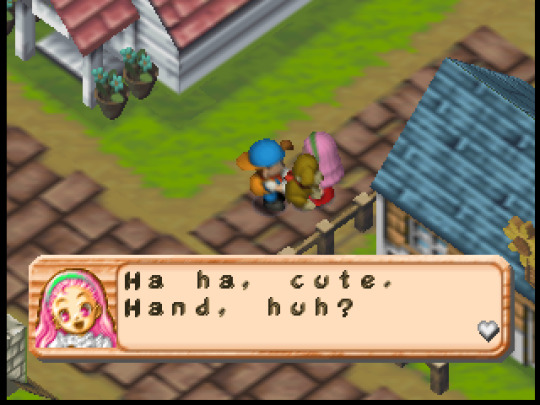


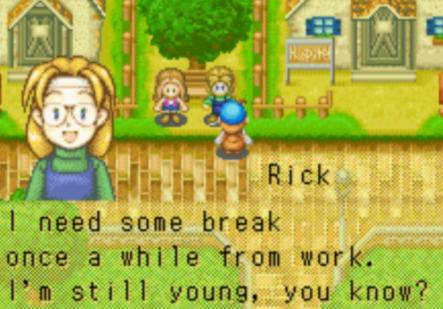
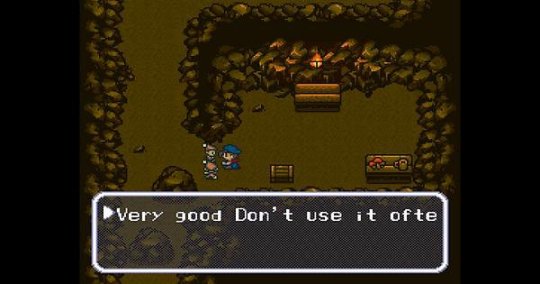

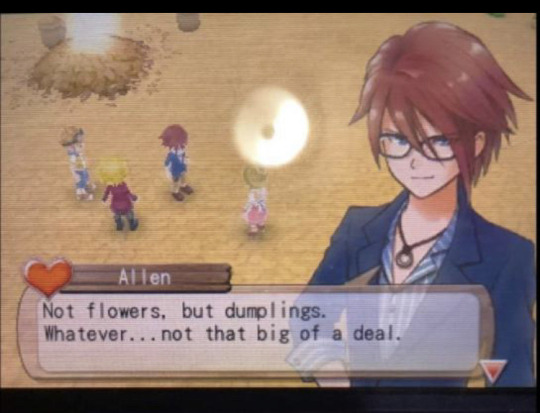
and then there's stuff that's so messed up we don't even KNOW how it got there. like some of this shit i would 100% believe you if you just said the game got corrupted because if it isn't that then i can only assume the employees did a large dose of crack cocaine before translating these games. i'm talking like... entire lines that didn't even get translated. text so butchered its straight up unreadable. that one time they misspelled their own NAME in the startup screen. TWICE.

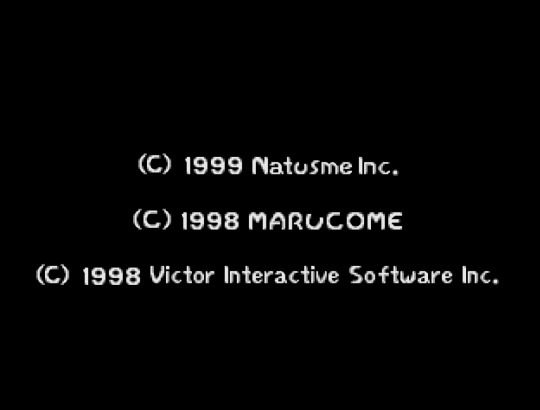

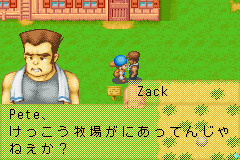


and, last but not least, probably one of my all time favorite errors in a natsume game but one i'll never be able to post here because it's funny purely in context- and it is the singular line in harvest moon: friends of mineral town where the priest, carter, just speaks to you in fucking German
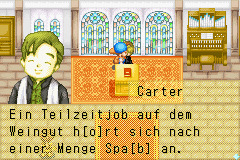
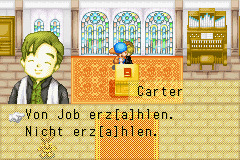
this. this is the error i don't have even the SLIGHTEST explanation for. and, correct me if i'm wrong, but i'm 99.9% sure nobody else does either.
this was....just one line. just the one line of dialogue. where he speaks german. in a japanese farming game that was being localized into english.
at least with the untranslated kanji you have some general sense of how that happened. like, yeah, okay, they just missed a line, whatever. but this isn't even remotely close to the same situation. there should be NO german in this equation whatsoever. it's like if you did 2 + 2 and somehow got 17. and nobody looked over your paper and went, "hey, that doesn't look quite right, man, maybe you should fix that", so you just turned it in and for some reason not even the TEACHER questioned it, they gave you a full grade and a gold star and put your paper on the whiteboard clear as day for all your classmates to see. that's what this feels like.
I. do not think the natsume employees are okay can someone check on them for me
#bokumono#bokujou monogatari#mod speaks#harvest moon#story of seasons#hmanb#harvest moon a new beginning#hm fomt#harvest moon fomt#harvest moon anb#harvest moon friends of mineral town
344 notes
·
View notes
Text
Flowers (Ethan x f!MC)
Book: Open Heart, book 2 Pairing: Dr. Ethan Ramsey x F!MC (Dr. Lilac Allende) Word count: 1 K Rating/ Warning: T/ Language
Premise: She is stung when he sends flowers to someone else on Valentine’s Day
Note: The timeline of this makes no sense but just pretend shhh lol
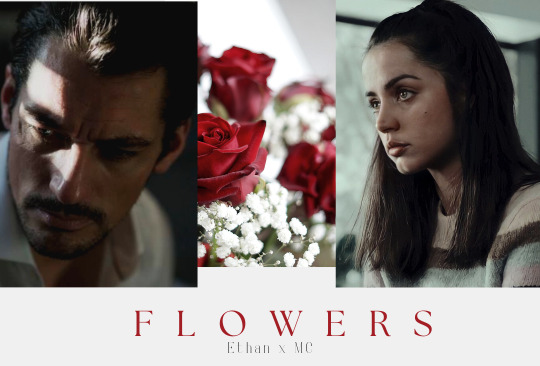
“I'm not listening,” Lilac informs her determined friend, quickening her steps.
Kyra, on the other hand, is undeterred. She has no problem matching Lilac's long strides. A few nurses glance their way, no doubt amused by how the short brunette has to practically jog to keep up.
“Come on, Lil! What better day to break your dry spell than Valentine's Day!”
“Shh!”
Luckily, there is no one within earshot that Lilac can see.
“He's tall,” Kyra presses in sing-song, her grin brighter than the florescent hospital lights above them. “He's dark. He's handsome.”
Despite herself, Lilac rolls her eyes with a laugh.
“You're insane.”
“You love me.” Kyra punctuates that with a wink. “At least tell me you'll think about it? I think you'll really like Derek.”
With a dramatic sigh, Lilac finally relents. “Fine. I'll think about it.”
That was good enough to put her friend at ease. She grins wider than ever before and goes her own way, vanishing through her office door. Lilac, meanwhile, travels through the halls absently, feeling more like a ghost than a resident. Her mind races with the prospect of dating someone new…of finally moving on.
It makes her stomach drop unpleasantly.
“Rookie.”
The rich baritone makes her jump. For a wild moment, she wonders if all her desperate pining summoned him there. Then, she reminds herself to stop being so ridiculous and pathetic.
“Dr. Ramsey.”
They hold each other's gazes a beat too long.
“Is there something I can help you with, Dr. Allende?”
Lilac, love struck and momentarily stunned by icy blue eyes, could think of many ways he could help her. Instead, she forces herself out of her reverie and unsuccessfully wills her pulse to descend to normal speed.
“Yes. Miss Chapman's results came back. I reviewed them and everything looks normal.”
He nods once. “Excellent. Please set them on my desk. I will review them when I return from my meeting with Naveen.”
She nods, but doesn't move.
He doesn't either.
Neither wants to abandon this rare, private moment. The way his eyes study her face feels far more intimate than any caress. Her heart is a frantic hummingbird, its wings flapping fiercely against her ribcage. Its only relief would be tearing her chest open or kissing Ethan.
Neither are possible.
At last, Ethan moves away and disappears down the hall.
“Get a grip, Allende,” Lilac mutters to herself when she finally regains movement in her legs.
The solitude of his empty office is a relief. Before she can dwell on what a fool she made out of herself, she hurries to drop off the file atop the grand mahogany desk. The movement, however, sends the neat pile of papers flying.
“Shit!”
Frantically, she dances around the office, arms flailing above her as she tries to catch the hurricane of papers. If anyone walked in at that moment, they would get a kick of the ridiculous sight. Just when she thinks she's recovered everything, a small, yellow note catches her attention from the floor.
Liberty Street Flowers, the top reads in bold letters.
The rational part of her brain says she should pick up the receipt, set it on Ethan's desk, and promptly continue with her day. A curious and morbid fraction of her brain, however, wants to read on. That part ultimately wins because she brings the receipt close and reads:
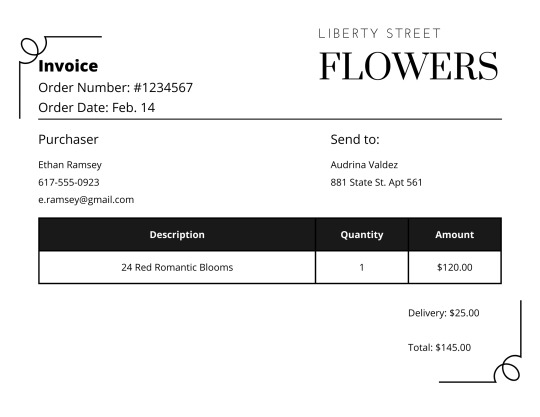
Something cold drills into her insides.
Lilac reads the receipt again, trying to make sense of it. Her eyes snag on the word "romantic" and her stomach drops to her feet. With a sickening feeling, she accepts the reality in her shaky hands.
The doors of the office open and she makes no effort to hide their receipt.
“Dr. Allende—”
The look on Lilac's face halts his steps.
“Are you alright?”
A deadly, poisonous silence heavier than lead follows. Then—
“I didn't take you for someone who celebrated Valentine's Day.”
More silence.
This time, his meticulously crafted expression betrays confusion.
“I don't. Not usually.”
Unable to help herself, she scoffs. Lilac should know better than to lash out— she should be walking away, head held high, ready to privately lick her wounds. At least then she'd have her decency. But the unforgiving sting of jealousy overpowers her, robbing her of all common sense.
Fuck decency.
“I also didn't know you were big on sending flowers.”
Icy blue eyes fall to the paper on her hands.
“You went through my belongings.”
Lilac ignores this, too hurt and angry to give him any explanations. Her throat is so tight at this point that she can barely get words out. The tears sting her eyes but she will hold them back if it's the last thing she does.
Ethan's characteristic stoicism begins to shift into anger.
“Dr. Allende, might I remind you that going through my private—”
“You never sent any to me.”
The words are small but impossible to miss.
They are mighty, too, because they seem to strike him like a whip.
“Lilac.”
His expression softens into something she can't bear to look at. It is akin to empathy and pity.
She straightens, enraged.
“I always forget,” she continues, the words heavy with venom. “I was just a good fuck for you, wasn't I? Good enough to fuck in secret but not to send flowers to.”
Her words hit a nerve. Ethan's face floods with color, icy eyes flashing dangerously.
“You have no idea what you're talking about.”
His tone is deathly and collected.
“Who is she?”
“What?”
“Who's Audrina?”
They are standing close now, almost nose to nose.
“Is she someone you plan to spend more than two nights with?”
He says nothing.
“Are you eventually running away on her, too?”
“Enough.”
The single word is like a slap.
“You have no right.”
She staggers back. The words are the twist to the knife and yet, she can’t begrudge them. They’re undeniably true.
“You have no right to act this way, Lilac. I am your boss and you're my employee. Who I send flowers to is none of your concern.”
He's right.
Lilac had no right to be jealous, no matter how desperately she loved him.
That's the part that stung the most.
Those blue eyes pierce her and she loses all steam. Humiliated, she all but flees the office, finally letting the tears win.

Author’s note: Meep.
#open heart#ethan ramsey#ethan x mc#playchoices#lort grant me the strength to write a part 2#also i still owe you guys that part 2 of jenner
108 notes
·
View notes
Text
Duck Prints Press Roundtable: Classic Hollywood

We got a blog post request from one of our backers on Patreon, to discuss classic Hollywood movies and related queerness – so here we are with a Duck Prints Press roundtable focused on our favorite classic Hollywood films, why we like the genre, and some classics that serve queer vibes. The contributors to this round table are: boneturtle, Nina Waters, Mikki Madison, E. C., YF Ollwell, Zel Howland, Linnea Peterson, Shannon, S. J. Ralston, Dei Walker, Meera S., Shadaras, Shea Sullivan and an anonymous contributor. Spellings and punctuation are [sic] throughout this post.
As an opener…
boneturtle: what is the definition of a classic hollywood movie? is it a particular time period?
Nina Waters: according to Wiki, “Style of filmmaking characteristic of American cinema between 1910s and the 1960s.”
This post is quite long, so in brief, here are the questions we chat about, and you can check out our answers below the read more!
1. What was your first introduction to classic Hollywood movies?
2. What’s something that you love about classic movies that you feel is missing from modern movies?
3. What classic Hollywood movies give you the biggest “queer vibes”?
4. Do you know any queer fanworks inspired by classic Hollywood movies? What are they?
1. What was your first introduction to classic Hollywood movies?
Nina Waters: My mother looooooved classic Hollywood movies, so I can’t remember any specific starting point. I think the first I really loved was The Wizard of Oz, though. Or maybe Seven Brides for Seven Brothers (so problematic, but the dancing still makes me so happy).
Mikki Madison: Oh no. I wrote a movie review blog in college and you have tapped into something primal in the back of my head with this. My dad was a HUGE fan of old Hollywood musicals so I grew up watching classic Hollywood movies. The most formative for me was probably The Sound of Music (although Nina. I am with you on Seven Brides for Seven Brothers; I loved that one). But seriously – the music, the slow burn romance, the grumpy one is soft for the sunshine one, the way Maria burrows her way into their lives and completely upends them, the adventure escape from the Nazis at the end…okay actually I’m realizing that was a lot more formative than I thought at the time, holy monkeys, how many of my favorite tropes can be traced to this.
E. C.: Do classic Disney movies count? If not, probably The Wizard of Oz. And some of the classic musicals and Hitchcock movies with my mom. (my brother was obsessed with The Sound of Music for a while, but that was 1965 so I don’t think that counts for this discussion)
YF Ollwell: (rubs my hands together evilly in doing PhD applications with a studio era project). My first introduction to classic Hollywood films was through my grandparents, but I came to LOVE them only recently vis-a-vis a professor and mentor in my Master’s program. he taught a studio system class that completely rewired my brain and showed me just how beautiful and rich this period of film was in a way i’d never considered. Also, without doxxing myself, my university hosts the paper archive of one of the major studios, so getting the opportunity to look at those documents only made me fall in love more.
Anonymous: Some Like It Hot, I believe. Technically, I watched Psycho earlier, but I was not paying attention. For some reason, the acting infuriated me and I couldn’t stand listening to anyone except Norman Bates.
Zel Howland: Probably Wizard of Oz! Not only did I grow up near where it was filmed, I was also in a stage production of it when I was a teen (playing Uncle Henry/the Emerald City Guard). It’s definitely not one of my favorite classics, but I do have a special place in my heart for it.
Linnea Peterson: My introduction to classic Hollywood movies was either The Sound of Music or The Wizard of Oz. Both of those were frequent re-watches in my early childhood (like ages 3-6).
Shannon: I know I saw a bit of classic hollywood as a kid (these were later, but we had Charade and a few other Cary Grant movies around along with My Fair Lady) but I didn’t think about classic hollywood on its own until college when a professor said I seemed down and assigned me a Charlie Chaplin marathon for homework. This was for a Shakespeare class so we eventually found a way to tie it back to the coursework
S. J. Ralston: I also grew up in a house where we watched a lot of older movies, but it was probably something Buster Keaton did, or Casablanca.
Dei Walker: I know I watched Wizard of Oz as a young’un, my grandmother having been a Kansas farm girl, but the strongest memory I have is middle school, when a couple of the teachers ran a classic movie club. The first one I remember watching was Singin’ In The Rain. ((you are now required to go watch the Tom Holland Umbrella lip sync video. It’s okay, I’ll wait.)) We also watched My Fair Lady and Breakfast at Tiffany’s.
Meera S.: old hollywood movie: Wizard of Oz (1939)
2. What’s something that you love about classic movies that you feel is missing from modern movies?
Nina Waters: I think the writing on most classic movies was stronger, and the effects more interesting. Because they couldn’t just rely on computers, CGI, and advanced post-production to fix things, and also because being black and white or basic technicolor meant they couldn’t cover crap with lots of flashy bright colors, making something really good was a lot harder. As a result, a lot of old movies were crap, but there’s also a ton that shine so brilliantly without any of the modern distracting pizzazz.
boneturtle: okay, so i’ve watched two classic movies that i can remember: 12 Angry Men and The Yearling. I wouldn’t recommend either based purely on vibes, they’re depressing as hell, but I completely agree with Nina that the writing and artistry are just on another level and shine through more in these movies compared to modern films that can sometimes lean too heavily on special effects and high production quality rather than solid fundamentals. my favorite era in movies, though, is the 1980s. i am a huge fan of the 1980s coming-of-age movies, and part of that is because of their similar focus on the acting and the writing and simply telling a good story that sticks with you, rather than on creating exciting special effects or overselling the premise.
Nina Waters: oh 12 Angry Men is sooooo good. I’ve never seen the Yearling but I still remembering sobbing over the book so nopenopenope
boneturtle: yeah the movie was brutal
Nina Waters: 12 Angry Men I’ve done both (read and seen) and it’s depressing how completely 100% accurate it still is. The same can be said for a lot of classic movies that are about societal problems. Like, Mr. Smith Goes to Washington should be required watching imo. oh and All Quiet on the Western Front completely rewired my brain when I saw it. I still haven’t recovered. I can’t even bring myself to read it.
Mikki Madison: I agree with Nina – I think a lot of classic Hollywood movies still had deep roots in theater in terms of the writing and the acting and the practical effects, and that comes across in many of them to this day. Like, that’s one of the reasons I love 12 Angry Men – it’s based on a play and it’s set almost entirely in one room, and the drama of the story comes entirely from the interactions of these 12 strangers as they decide whether another human being deserves to die. It’s so tight. Also many of the actors didn’t just act; they sang, danced, played instruments, etc. I’ve watched White Christmas every year for like. 10 years, and I’m still so impressed with Vera-Ellen‘s dancing through the whole thing. and regarding practical effects and sets, I think even the old epics feel more epic precisely because to have a crowd of thousands, they had to literally have a crowd of thousands there to film
E. C.: LONG CUTS. It’s especially noticeable in musicals, but even in regular movies, the footage used from one camera might last 10, 20, 30 seconds before it cuts to another angle. It changes the entire feeling of the scene, to have all the action be by the actors/effects instead of generated by editing.
Meera S.: … what is missing: honestly save for a handful of exceptions the time and effort I think…
YF Ollwell: I think the actual LOOK of the films was so much richer than in films today, thanks to better lighting, costumes, and set design. I also prefer the studio style of acting, and there’s also so much more chemistry and eroticism between characters, paradoxically to (or, honestly, probably because of), all the restrictions on content. The average mid-century Hitchcock is SIGNIFICANTLY steamier than any so-called ‘erotic thriller’ today lol
Anonymous: Not gonna lie, I actually have a low tolerance for most of the acting styles found in this time period, particularly how gravely most of the leading men sound all the time. It’s like listening to a constant noir detective monologue and I hate it. That said, I do appreciate how much wonder Hollywood classics can carry with them. You can tell people were having fun making most of these films and exploring what the art form could do.
Zel Howland: MUSICALS. Movie musicals now try so hard to be ironic or self aware, they use autotune and modern singing style (let alone actors who are big names rather than big singing or dancing talent), and my biggest gripe is that nobody knows how to film dance anymore. I think a lot of cinematographers and directors and editors these days think dance is boring, so they do all these cuts and focus on individuals in big dance numbers and zoom in on faces. Whereas old Hollywood movie musicals would have long cuts of dance numbers that let the dance do the talking, in scenes where the dance was the point! (can you tell that I used to be a dancer? I have a lot of thoughts about this)
Shadaras: Practical effects my beloved <3 Seriously, the care and artistry that goes into practical effects, costuming, set design, etc is so incredible! And, as folk have been saying, having something actually there makes it a lot easier for actors to interact with and react to what’s going on instead of needing to imagine the digital effects which will be created in post. (I don’t know if it’s a direct response to the prompt so much as a grouch about modern movies, but: I wish that writers were more involved with production. I wish that actors were trusted with the full context of their scripts. I wish that people weren’t so freaked out about the idea of spoilers. If a story is good and the movie is well-produced, people will want to watch it even if they know every single beat! If you think your movie only works because of a surprise twist, that’s bad, actually!)
Linnea Peterson: Movie musicals that are just allowed to be musicals. I’m interested to see the Wicked movie that just came out, but I feel like on the whole there are fewer true movie musicals by percentage of movies made these days.
Shannon: I agree with what folks have said about the theatricality you get in older films. We get so many takes now and while it gives actors room to play and try things without worrying about how expensive literal film is, you also get close ups where they’re acting across from a stand in or with nobody there at all, and I think it loses a lot of the chemistry or dynamism of a back and forth uncut scene. Modern actors train to work without it, but audiences get so drawn in when that back and forth is onscreen, I think we miss it even if the performers can work without it
S. J. Ralston: I miss the lower fidelity visuals from old movies. I really don’t need to see every pore and hair lovingly rendered; it makes modern hi-fi movies look sticky and wet to me.
Dei Walker: Trusting the audience. Classic movies had you, and they knew they’d get the buy-in, and today it seems like there needs to be Explanations ™ and/or so much self-awareness. Just trust me to get what you’re putting down, okay? If you’re okay with going outside Hollywood, then I absolutely suggest Bollywood for more musicals.
3. What classic Hollywood movies give you the biggest “queer vibes”?
Nina Waters: Absolutely hands down my favorite for queer vibes is The Thin Man. I adore this movie, and when I was an adult I realized it’s because Nick and Nora have the epitome of bi4bi disaster bi energy. They’re fantastic.
Meera S.: There’s some speculation that irl Marylin Monroe was a lesbian (based on her diaries) who only slept with men to get ahead and I’d fully believe that if it were any of my business but I don’t speculate on the dead other than to than say, “Alexander Hamilton would be a bi drama king today… if he had the words.” that’s fine saying absolutes about especially any historical figure is bad historian-ing. Cause speaking in absolutes when you don’t know for certain is misinformation and misinformation is bad even if it serves your purposes. But if someone or a character says they are x thing I take them at their word. Like Cynthia Erivo talked about being bisexual in 2022 no one outed her. Like Lestat and Elphaba say they’re bi and their respective authors agreed in text and meta so.. bisexuality be upon you.
E. C.: The Philadelphia Story (and High Society), and all of the cross-dressing/drag comedies: Some Like It Hot, Victor and Victoria, etc. I’m sure I’m forgetting something obvious.
YF Ollwell: How about some classic Hollywood films that are queer, and (in my opinion) should be considered such even if they were hampered by censorship? Hitchcock made three that are stunning: Rebecca (1940), Rope (1948) and Strangers on a Train (1951). Queen Christina (1933) is also VERY queer. (i bring up hitchcock so much because he’s the subject of my capstone and i’ve been swimming in his documents and filmography for three months lol)
Mikki Madison: Hitchcock is classic for a reason. I remember the first time I watched Rear Window; I thought it was so slow to start, but I didn’t realize how gradually the tension had been increasing until I was absolutely on the edge of my seat and couldn’t look away
Nina Waters: I’ve never seen Hitchcock and I really need to fix that
E. C.: YES you do. Rear Window and Rebecca are better places to start (imo) than, say, The Birds or Psycho (but I would love to hear YF Ollwell’s take)
YF Ollwell: if i had to pick the best starting point it’d be his run of three in the mid to late 50s (rear window, vertigo, and north by northwest), then psycho which is contextualized by those three, then uhh strangers on a train because i love it and its really good
S. J. Ralston: Strangers on a Train is also my favorite and it doesn’t get nearly enough love!
YF Ollwell: i am the world’s number 1 Rope defender and its easily the gayest of the three i mentioned (as in i have seen the production code memos that say ‘you need to make this film less gay’) but will also admit its not for everyone lol. psycho is still absolutely worth a watch from a purely formal and performance standpoint imo. it looks CRAZY. and there’s a scene between anthony perkins and martin balsam that my mentor finds an excuse to show in every class for good reason LOL
Mikki Madison: Rear Window and North by Northwest are my favorites, I think
Anonymous: Again, I am going to say Some Like It Hot, which is pretty textually queer! If that doesn’t count, then I’ll say The Wizard of Oz. Its camp vibes are unmatched.
Zel Howland: Some Like It Hot has already been mentioned, but it ought to be mentioned a million more times. Queerest film I’ve ever seen, I have no idea how that got past the censors. I’m also going to give an honorable mention to Singin’ In The Rain, which is less textually queer but has thee polycule of all time.
Shadaras: and +1 to Singin’ in the Rain as a queer movie/production
Shea Sullivan: Auntie Mame was a big one for me. Definitely had queer vibes. And Victor Victoria was amazing.
Shadaras: Victor Victoria! <3 Absolutely a movie with hella queer vibes
Linnea Peterson: I don’t have good answers to 3 and 4 because my peak movie-watching period has zero overlap with the part of my life where I’ve known I’m queer (movies are just not the kind of sensory and mental stimulus my autistic brain craves). I do have a friend who’s obsessed with the implied polycule in Singing in the Rain, though.
S. J. Ralston: “The Court Jester“! Not only does it have catchy musical numbers, a cast full of powerhouses (Danny Kaye! Angela Lansbury!), and some of the most elaborately comedic fight scenes ever put to film, the two protagonists are both So Very Gender and it’s a delight to watch.
Dei Walker: I honestly don’t know because I don’t watch a lot of movies at all, classic or not. One of my role models/coworkers growing up loved Audrey Hepburn, so Breakfast at Tiffany’s has queer vibes by adjacency but I wouldn’t say it in and of itself has a queer feel to me.
Meera S.: queer vibes: the wizard of Oz, and yeah it is cause the wicked years are bisexual and Ozma in the Oz books is basically trans by 1900s standards.
In conclusion, our list of queer-vibes classics for your enjoyment:
Auntie Mame
The Court Jester
High Society
The Philadelphia Story
Queen Christina
Rebecca
Rope
Singin’ in the Rain
Some Like it Hot
Strangers on a Train
The Thin Man
Victor/Victoria
The Wizard of Oz
4. Do you know any queer fanworks inspired by classic Hollywood movies? What are they?
Nina Waters: S. J. Ralston’s contribution to Aether Beyond the Binary has some classic hollywood vibes/inspiration, even though it’s sci-fi with robots. (the robots are of classic Hollywood stars!)
Anonymous: Yes, plenty, most of which are based on The Wizard of Oz.
Shadaras: yeah, I was similarly going to say that I’d need to think about fanworks, but the Oz books are pretty queer on their own! there was recently a Classic Film Fanfic Exchange (ao3 | dw) which was an exchange for fanworks about movies released before 1/1/1980, which is a slightly broader period of time than we’re talking about! but it’s fun seeing what people requested and created, and that there was enough enthusiasm around the idea to have a whole exchange about it! (in other exchanges, Yuletide would inevitably have some fun fanworks for classic movies as well, but none come immediately to mind.)
Dei Walker: I do not, but this is making me want to see about writing some!
Talk classic Hollywood flicks to us! Which give you queer vibes? What classic-inspired modern queer works are you familiar with?
#duck prints press#roundtable#hollywood#classic hollywood#hollywood movies#classic hollywood movies#queer hollywood movies#queer movies
3 notes
·
View notes
Text
The sheeb listens to JRWI Riptide 3-word summary twitter thread, now with 100% less twitter!!!!
Before twitter totally went to shit, i had a thread that i was adding to every time i listened to an episode of jrwi! I had to write a summary or comment on the episode with 3 words or fewer, although exaggerated spellings and punctuation for emphasis were totally allowed so it wasn't a strict rule. It was just a silly haha way for me to try and motivate myself to keep listening cause i'm v bad at picking up new habits (like listening to podcasts), so i was hoping that posting about it would build the habit and get me to pay better attention so i could remember details to comment on. Heads up, this was already a very, very long twitter thread and i'm still updating it, so it's gonna be a long post. Also spoilers for JRWI Riptide, up to ~roughly episode 60 atm. will update though! :) also i'm copypasting from where i archived the thread on discord so all the emoji's are broken, pretend they're all normal, ok? JRWI SPOILERS AHEAD!!! FINAL WARNING!!!!
(Jan 2023) (First tweet in thread: finally successfully listening to podcasts!! so every time i finish an episode of jrwi i’m gonna reply to this tweet with a 3 word or less summary we’ll see if i make it past episode 10, not hopeful since it took me 2 months to finish episode 1 :sob: )
Starting from zero funny fish man :)
Chipwrecked! mmm monke :)
The Laughing City Gillion slaps balds
The Baldening slapping more balds (April 23)
The Curse of Loffinlot started listening again!!
Off With His Head! Gillion Marxist arc?!? :0
A Mist Opportunity Chip autocanniballism arc??!!? D:
A Hero’s Burden Gillion need hug :(
A Victorious Banquet! black rose mentioned?!?!?!?! :0
The Hangover (i made it to 10 episodes!!) omg the beloveds! <3
Return to the Open Sea Inception but Jay
The Endless Game (ft. Ranboo) ranboo is real?!?!? :0
Showtime! (ft. Ranboo) Chip discovers reaganomics
The House Always Wins (ft. Ranboo) farewell friend Clorten :(
The Chip on My Shoulder Gillion was right >:(
Fish and Chips i’m gonna cry :’)
The Siren's Call Gillion: '…That's tits' :thinking:
Striking a Chord chip's not normal :face_with_raised_eyebrow: :worried:
The One the empress… :flushed::flushed::flushed::flushed::flushed::flushed:
The Sanctuary the empress… :angry::angry::angry::angry::angry::angry:
An Act of Love Nat 20 kiss?!?!?!?!
True North Chip = Weaponised incompetence
Downhill Desires YASS COMRADE TIDESTRIDER!!!!
Empress of Malice Jay absolutely slays
The Hole in Your Heart Get deez'd bitch :sunglasses: (May 23)
First Blood pretzel is terrifying :squid:
The Pirate Code Gil discovers cat :)
Making a Splash scary teleport lady
The Paramount Tournament FIGHT! FIGHT! FIGHT!
Jack the Jolly Roger chip pants collection (June 23)
One Remaining Rose ELIZABETH ALIVE?!!?!? WTF??!!?
Breaking The Ice Gillion got adopted (July 23)
Thunderdome of Destiny (ft. Pokay) gillion briefly homophobic
Wrath of La Alma (ft. Pokay) that's not good D:
Sign here (ft. Pokay) jay eated paper
The Luxbris Pearl (ft. Pokay) i cry lots
Indemnification (ft. Pokay) closed eye trickshots
The people’s Champion (ft. Pokay) combat against ball
A sea of Red and Gold oh shit.
The Navy's Armada Chip saying son :') :pleading_face: :sob:
Growing Pains ||ollie now big||
The Serpent borfd it
City of Steam new favourite episode :sob::sob:
Blossoming Trust pinky promise :)
The Perfect Crime OH SHIT!! D:
Robot Rumble imposter among us
What Binds Us awww :') awh :face_holding_back_tears::face_holding_back_tears: awww (August 23)
Shattered Kingdom Scotland confirmed non-canon :pensive:
The Duke of Everything (ft. Jschlatt) pretzels everywhere
The Block (omg!!! 50!!!! woo!!!!) plausibly deniable clown
Blistering Trials NO! GIVE HIM!!!! :(
Death March FUCKING WHAT?!?! WHAT!!??!
Not Ferin Well FUCKED UP!!! CRYING!!!!! :sob::sob::sob: :(
A Dead Man’s Tale (ft. JoCat) NEW SCOTTISH GUY!!!! :scotland::scotland::scotland::scotland:
Till Death Do We Part (ft. JoCat) many nat 20s
Mystery and Misery oh shit, chip…
The Hull of the World WAAHHHH EDYN :')
The Tides Between Us EMOTIONAL WHIPLASH WTF
A Price to be Paid Jay escaped employment (September 23)
Price is Right woah, solo episode?
Super Savvy Sleuthing Slugs chaos, of course
Chaos and Consequences ending was fucked
Farewells earl :( :( :( miss him :( :( :( :)
The City of Night new guy!!!!!!!!!!!!!!!! (October 23) Riptide Origins: Humble Beginnings actual siblings real
Dressed to the Nines jay gets bitches
4 notes
·
View notes
Text
Enhance Your English Email Writing: A Guide to Clear, Concise Communication
Mastering the art of email writing is essential for effective professional and academic communication. By focusing on clear and concise language, using a formal tone, and following a structured format, you can convey your message with clarity and professionalism.
Key Elements of Effective Email Writing
Clear and Concise Language
Avoid unnecessary jargon or lengthy sentences.
Use simple, direct language to express your ideas.
Formal Tone
Address recipients respectfully, especially in professional or academic contexts.
Maintain a courteous and polished tone throughout.
Structured Format A well-organized email makes your message easier to read and understand. Follow this structure:
Subject Line: Briefly state the purpose of your email (e.g., "Request for Information on Upcoming Conference").
Salutation: Begin with a proper greeting (e.g., "Dear Dr. Smith," or "To Whom It May Concern,").
Introduction: State who you are and the purpose of the email in one or two sentences.
Main Message: Provide necessary details or context in a clear and organized manner. Break up large sections with paragraphs or bullet points if needed.
Conclusion: End with a summary or call to action, expressing gratitude or stating next steps.
Sign-Off: Use polite and professional endings such as "Sincerely," "Best regards," or "Yours faithfully."
Practical Examples
1. Requesting Information Subject Line: Request for Details About Fall Internship Program Body: Dear [Recipient's Name],
I hope this message finds you well. My name is [Your Name], and I am a [Your Position, e.g., university student or job title]. I am writing to inquire about the details of your Fall Internship Program, specifically the application deadline and required documents.
I would greatly appreciate it if you could provide this information at your earliest convenience. Thank you for your time and assistance.
Best regards, [Your Name]
2. Submitting an Assignment Subject Line: Submission of Research Paper for [Course Name] Body: Dear Professor [Last Name],
I hope you are doing well. Please find attached my research paper, titled "[Title of Paper]," submitted as part of the requirements for [Course Name].
If you have any questions or need further information, please do not hesitate to reach out. Thank you for your guidance and feedback throughout the semester.
Sincerely, [Your Name]
Tips for Professional Email Writing
Proofread: Always review your email for grammar, spelling, and punctuation errors before sending it.
Be Polite: Use phrases like “please” and “thank you” to maintain a courteous tone.
Stay Relevant: Stick to the main topic and avoid including unnecessary information.
Attachments: Mention any attachments in the email and ensure they are properly labeled.
By practicing these principles, you can enhance your email writing skills, making your communication more effective and professional. Whether you are requesting information, submitting assignments, or corresponding with colleagues, clear and structured emails help create a positive impression.
For More Details
Visit us:- Formal Email Examples
You can also try one of our Official Application ENGLISHBHASHI available in Play Store with which you can refine your English Skills we assure you that you will be able to speak English much better in just 30 Days.
Share this post with your friends and family who are eager to enhance their English skills. Let’s inspire and empower each other on this incredible language-learning path. Together, we can achieve greatness! So, what are you waiting for? Visit EnglishBhashi today and embark on an exciting adventure of language learning.
0 notes
Text
Perfect Your Words: Professional Proofreading and Editing Service

In today's fast-paced world of content creation, whether you're a student, a business professional, or an aspiring author, the quality of your written work plays a crucial role in how you are perceived. Whether it's a report, a blog post, an academic paper, or a book manuscript, the way you communicate your ideas can either enhance or undermine your credibility. That's where a professional proofreading and editing service comes in.
A proofreading and editing service ensures that your work is free of errors, consistent, and well-structured, enhancing its readability and effectiveness. But what exactly do proofreading and editing involve, and how can they elevate your content? In this article, we’ll explore how these services can help perfect your words, boost your credibility, and ensure that your writing resonates with your audience.
What is Proofreading and Editing?
Before diving into the details, it’s important to distinguish between proofreading and editing, as they are two distinct processes, though they often overlap.
Proofreading: The Final Step to Perfection
Proofreading is the final stage of the writing process, focusing on identifying and correcting surface-level errors such as:
Spelling mistakes
Grammar issues
Punctuation errors
Typos
Formatting inconsistencies
The goal of proofreading is to ensure that the document is polished and error-free before submission or publication. Proofreading typically comes after editing and addresses minor issues that might have been overlooked during the earlier stages of writing.
Editing: Refining the Structure and Flow
Editing, on the other hand, is a more comprehensive process that goes beyond surface-level corrections. It involves reviewing the content for:
Clarity and coherence: Ensuring that the ideas are expressed in a logical and clear manner.
Tone and style: Adjusting the writing to suit the target audience, whether the tone is formal, casual, persuasive, or informative.
Structure: Improving the organization of the content, including paragraphs, headings, and overall flow.
Consistency: Ensuring consistent use of terminology, punctuation, spelling (e.g., American vs. British spelling), and formatting.
Conciseness: Eliminating redundancy and ensuring the content is concise without losing its meaning.
Editing can be seen as refining the overall quality and readability of a piece, making it more engaging and polished.
Why You Need Professional Proofreading and Editing Services
While it’s possible to proofread and edit your own work, many people opt for professional proofreading and editing services to ensure their content is at its best. Here’s why:
1. Objectivity and Fresh Perspective
When you write something, you're often too close to the material to spot errors or weaknesses. After reading the same content multiple times, it's easy to overlook mistakes or assume the flow of ideas makes sense. A professional editor or proofreader, however, brings a fresh set of eyes and a level of objectivity that can spot issues you might have missed.
2. Expertise and Attention to Detail
Professional editors and proofreaders are highly trained to spot errors quickly and efficiently. They possess the technical knowledge of grammar, punctuation, and style rules that can ensure your work is not only error-free but also polished and professional. Their attention to detail ensures that your content maintains a high standard of quality.
3. Improved Readability and Flow
An experienced editor can enhance the readability and flow of your content. Whether it's a blog post, a business proposal, or a research paper, an editor will work to ensure that your ideas are presented in a logical sequence, making your writing more engaging and easier to follow. This improves the overall impact of your message, making it resonate more effectively with your audience.
4. Time-Saving
Editing and proofreading can be time-consuming tasks, particularly for long-form content. By outsourcing these services, you free up your time to focus on other important tasks, such as brainstorming new ideas, strategizing, or even doing the research for your next piece of content. Professional services help you maximize your time and ensure that your content is completed on schedule.
5. Polished Professional Image
Whether you're a student submitting a research paper, an entrepreneur crafting a business proposal, or a writer submitting a manuscript, having error-free and well-polished content creates a positive impression. Your work reflects your professionalism, attention to detail, and dedication to quality. In today’s competitive world, that can make all the difference in how you are perceived.
The Process of Proofreading and Editing
A professional proofreading and editing service follows a structured process to ensure that your content reaches its full potential. While every service may have slight variations, the general process typically involves the following steps:
Step 1: Initial Review and Assessment
The first step is to review the document to understand the scope of work and the specific goals. The editor or proofreader assesses the document’s tone, structure, and clarity while identifying areas that may need work. The type of content (e.g., academic, business, creative) may dictate different approaches and levels of intervention.
Step 2: Content Editing
For editing services, the next step is to focus on the overall content. This phase can involve:
Rewriting or restructuring: Ensuring that the document flows logically and that ideas are presented clearly.
Clarifying ambiguities: Fixing any sections that may be unclear or need elaboration.
Strengthening arguments: Making suggestions to improve the effectiveness of the writing, especially in persuasive or academic content.
Step 3: Proofreading
Once the content is structured and refined, the proofreading phase begins. The proofreader combs through the document to catch any lingering mistakes or inconsistencies. They focus on:
Grammar and syntax: Correcting any mistakes in sentence structure or word usage.
Spelling and punctuation: Ensuring the document is free from spelling errors, typos, or improper punctuation.
Formatting: Checking for consistent font usage, headings, margins, and alignment.
Step 4: Final Review and Delivery
After proofreading, a final review ensures everything is in place. The proofreader will confirm that all changes are made and that the document is ready for submission or publication. The final version will be delivered to the client in the desired format (Word, PDF, etc.).
Choosing the Right Proofreading and Editing Service
With so many proofreading and editing services available, it’s essential to choose the one that best suits your needs. Here are some factors to consider:
1. Expertise and Experience
Look for a service with experienced editors or proofreaders who have specialized knowledge in your field or type of writing. For example, if you are an academic, you may want someone with experience in academic writing and citation formats. Similarly, if you're writing a business proposal, find someone who understands corporate communication and business language.
2. Turnaround Time
Different services offer varying turnaround times. Some projects may need a quick turnaround, while others can be more flexible. Be sure to select a service that can meet your deadlines without compromising on quality.
3. Customization and Communication
Good communication is key when working with a proofreading and editing service. Ensure the service is open to collaboration and can tailor their approach to your specific needs. A personalized service will ensure that your content remains authentic while benefiting from professional input.
4. Reviews and Testimonials
Check the service’s reputation by reading client reviews and testimonials. Past clients can provide valuable insight into the quality and reliability of the service.
Conclusion
Whether you're a business professional, student, author, or anyone who relies on written content, professional proofreading and editing services can make a significant difference in the quality of your work. These services help perfect your words by ensuring your content is error-free, well-structured, and perfectly tailored to your audience. With their expertise, attention to detail, and ability to refine your ideas, professional editors and proofreaders ensure that your writing stands out and leaves a lasting impression. Perfect your words, and in turn, perfect your communication.
1 note
·
View note
Text
What Are the Best Approaches to Data Preprocessing in LLM Development?

The development of large language models (LLMs) like OpenAI's GPT, Google's Bard, and others is a complex process requiring meticulous attention to detail at every stage. Among these stages, data preprocessing plays a pivotal role, as it directly impacts the quality, accuracy, and overall performance of the resulting model. Proper preprocessing ensures that the input data is clean, relevant, and optimized for the training process.
This blog explores the best approaches to data preprocessing in LLM development, emphasizing its importance, key techniques, and challenges faced during the process.
Why Is Data Preprocessing Crucial for LLMs?
LLMs are trained on massive datasets to understand and generate human-like text. However, raw data collected from the internet or other sources is often noisy, redundant, or irrelevant. Without preprocessing, the model might learn from flawed or biased data, leading to suboptimal performance or unintended consequences like perpetuating stereotypes.
Key Goals of Data Preprocessing for LLMs:
Data Quality Enhancement: Remove noise, errors, and irrelevant content to improve data reliability.
Bias Mitigation: Address imbalances or stereotypes in the data to reduce harmful outputs.
Optimization: Convert raw data into a format suitable for efficient model training.
Scalability: Prepare data for the scale and complexity required by LLM architectures.
Best Approaches to Data Preprocessing
1. Data Collection and Source Validation
Before diving into preprocessing, it's essential to start with robust data collection and validate the sources. High-quality training data leads to better model performance.
Diversified Sources: Gather data from a mix of domains, including books, research papers, websites, and open datasets, to ensure the model has broad knowledge.
Source Credibility: Evaluate the authenticity of sources to filter out misinformation.
Multilingual Data: For multilingual LLMs, include diverse languages and dialects to improve linguistic capabilities.
2. Data Cleaning
Data cleaning involves removing unwanted artifacts, errors, and irrelevant content from the raw dataset.
Key Techniques:
Duplicate Removal: Ensure no redundant examples exist, which could waste computational resources.
Noise Reduction: Eliminate advertisements, boilerplate text, and formatting errors.
Outlier Detection: Remove sentences or paragraphs that are nonsensical, extremely biased, or irrelevant.
HTML Parsing: For web-sourced data, strip away HTML tags and metadata that don't contribute to meaningful language understanding.
Tools to Use:
Regex for pattern-based cleaning.
Python libraries like Beautiful Soup for web scraping cleanup.
3. Text Normalization
Normalization ensures that text data is consistent in structure and style.
Key Steps:
Lowercasing: Standardize all text to lowercase unless case sensitivity carries meaning (e.g., proper nouns).
Punctuation Handling: Remove or standardize punctuation depending on the dataset's focus.
Tokenization: Break text into smaller units like words, phrases, or subwords.
Spelling Corrections: Correct misspelled words using libraries like Hunspell or custom dictionaries.
4. Language-Specific Processing
When working with multilingual datasets, it is crucial to address language-specific nuances.
Examples:
Stopword Removal: Remove common words like "the," "is," or "and," which don't contribute much semantic value.
Stemming and Lemmatization: Reduce words to their base forms for better consistency.
Accent Normalization: Convert accented characters to standard forms, e.g., "café" to "cafe."
For languages like Chinese, segmenting characters correctly is critical since words are not separated by spaces.
5. Removing Sensitive or Biased Content
LLMs can inadvertently perpetuate biases present in the training data. Proactively identifying and removing such content is crucial.
Methods:
Bias Identification: Use tools or manual audits to detect biased language or stereotypes.
Sensitive Content Filtering: Identify and remove data that includes hate speech, explicit content, or harmful ideologies.
Data Balancing: Introduce counterexamples or additional data from underrepresented groups to balance the dataset.
6. Data Annotation and Labeling
In some cases, labeled data is necessary to fine-tune LLMs or train smaller supervised models.
Steps:
Manual Annotation: Employ experts to annotate data for tasks like sentiment analysis or named entity recognition.
Crowdsourced Annotation: Use platforms like Amazon Mechanical Turk to scale the annotation process.
Automated Labeling: Leverage pre-trained models to label data, followed by human validation.
7. Deduplication and Redundancy Removal
Training datasets for LLMs often exceed terabytes in size, and duplicates can create inefficiencies or reinforce biases.
Techniques:
Hash-Based Matching: Identify duplicates using hash functions.
Semantic Matching: Use cosine similarity or embeddings to detect semantically similar entries.
8. Data Augmentation
Augmentation techniques expand the dataset by generating new examples, increasing the model's robustness.
Methods:
Paraphrasing: Rewrite sentences to introduce variability.
Back Translation: Translate text to another language and back to the original.
Synonym Replacement: Replace words with their synonyms to diversify input.
9. Format Conversion
LLMs require data to be in a specific format, such as JSON or plain text, with structured metadata.
Steps:
Convert PDFs, HTML, or other formats into plain text.
Add metadata tags (e.g., source, timestamp, or language) to enable better context management during training.
10. Data Sampling
Not all data is equally important. Sampling ensures that the training dataset remains diverse and representative.
Methods:
Stratified Sampling: Ensure all categories or domains are proportionally represented.
Importance Sampling: Focus on high-quality data subsets for training.
11. Dataset Documentation
Documenting the preprocessing pipeline is essential for transparency, reproducibility, and debugging.
Documentation Includes:
Sources of data.
Steps taken during cleaning and normalization.
Decisions about inclusion or exclusion criteria.
Known limitations or biases.
Challenges in Data Preprocessing for LLMs
While preprocessing is critical, it is not without its challenges:
Scale: Managing and preprocessing datasets that span terabytes requires robust infrastructure and efficient algorithms.
Bias Detection: Identifying subtle biases in massive datasets is difficult and often requires domain expertise.
Linguistic Diversity: Handling multiple languages with unique structures and idioms demands tailored preprocessing techniques.
Evolving Standards: Preprocessing methods must adapt as societal norms and ethical standards evolve.
Conclusion
Data preprocessing is a cornerstone of large language model development. A well-prepared dataset can significantly enhance the model's performance, reduce biases, and ensure robustness across diverse tasks. By following the best practices outlined above ranging from data cleaning to normalization, bias mitigation, and sampling developers can lay a strong foundation for successful LLM training.
However, preprocessing is not a one-size-fits-all process. Each project may require adjustments based on the model's objectives, the nature of the dataset, and the ethical considerations involved. Continuous refinement, transparency, and adherence to ethical principles are key to building language models that serve a diverse and inclusive audience.
0 notes
Text
How to Prepare Your Child for 11+ Exam of the Grammar School?

What is a Grammar School?
Grammar schools are selective secondary schools in England and Northern Ireland funded by the State. These schools select their pupils for Year 7 through an academic examination called the 11+ Grammar School Admission. The competition for places is generally very high and it requires special preparation to be able to crack the 11+ exam. Just to give the readers a perspective regarding the number of places in Grammar Schools, less than 5% of secondary school pupils in England attend Grammar Schools. We are going to delve into the details of how to prepare your child for the 11+ exam and shall focus on some of the most effective tips for doing so.
youtube
Book Your Free Trial Today!
https://supermathsapp.com/home/register
Find out what subjects will your child be tested in– The content of the examination for each Grammar School in the country is different. Generally, the questions in the exam are based on some or all of the following subjects:-
English – Questions on English include those related to vocabulary, grammar, sentence structures, punctuations, spellings, and comprehension. Practise English writing exercises and hone your reading skills to comprehensively cover all these elements/topics of the English Sale offer for: language.it is always beneficial to enroll for English courses offered by a renowned institution such as BYITC. Their all-encompassing English language courses equip candidates with the requisite knowledge and the finer details needed to crack the 11 plus exam.
Maths – Questions on Maths require the child to have a thorough basic understanding of numeracy and Maths http://concepts.Do also include in your preparation any material covered in the Key Stage 2 Maths curriculum.
Verbal reasoning – The verbal reasoning part of the exam is quite diverse and there could be questions of different types Resources and Information. general, one should focus on building a sound vocabulary. Besides, the use of practice papers can be of immense help to your child in improving his verbal reasoning skills.
Non-verbal reasoning – This section of the exam includes questions on mirror images, spatial awareness, addition and subtraction using objects, different shapes, etc.
It is imperative as well as important for your child to prepare questions from all these domains/topics for the 11+ exam preparation.
Practice tests – Taking practice tests is one of the most effective methods to crack the Grammar School entrance exam as they help the child get familiar with the layout of the exam. For 11+ Grammar School Admission exam preparation online, a lot of resources are available on the Internet as comprehensive practice material for the 11+ exam.
Hone your child’s skills, instead of encouraging him to develop new ones for solving the most difficult questions– Towards the end of the question paper, the 11+ exam can have some challenging questions. There’s no point in making your child learn new skills to solve these questions, because your child may not have time to attempt them anyway. Rather work on your child’s strengths and hone his existing skills so that he can solve the more straightforward questions with ease.
Hire a private tutor – Private tutoring often proves to be very effective for Grammar School entrance exam preparation as it ensures that your child gets undivided attention from someone really in the know of the nuances of the 11+ exam. Although finding a seasoned tutor for the preparation for the 11 plus exam is not easy, you should start seeking one early.
The 11+ exam is a tough nut to crack – Start early, prepare thoroughly
It is indeed a privilege for a child to be studying in a Grammar School. Although this privilege does not come by easily,one can be amongst the lucky few by burning the midnight oil. The key to cracking the entrance exam for Grammar Schools is to start its preparation early. You may also opt for online tutoring.
Originally Published at:https://supermaths.co.uk/how-to-prepare-your-child-for-11-exam-of-the-grammar-school/
1 note
·
View note
Text
Role of Editing and Proofreading in Research Writing Assistance
Role of Editing and Proofreading in Research Writing Assistance
Research Writing Services is a rigorous and demanding process that culminates in the creation of a paper, thesis, or dissertation that must communicate complex ideas clearly and concisely. After countless hours spent researching, drafting, and revising, it can be tempting to submit the final draft without further review. However, the crucial steps of editing and proofreading are vital to ensuring the quality, accuracy, and professionalism of the final piece. These processes can elevate the clarity of your argument, correct technical errors, and make your work more persuasive to your audience.
In this blog, we will delve into the role of editing and proofreading in research writing assistance, highlighting why they are essential and offering practical strategies for incorporating them into your writing process.
Editing vs. Proofreading: What’s the Difference?
Though editing and proofreading are often discussed together, they are distinct stages in the writing process that serve different purposes.
Why Editing and Proofreading are Crucial in Research Writing
1. Clarity and Precision of Ideas
Editing plays a critical role in enhancing the clarity of your arguments and ensuring that your readers can follow your line of reasoning. Research writing often involves dense, technical language, so refining sentences to be clear and concise can prevent misinterpretations or confusion. Moreover, during the editing process, you can eliminate redundancy, clarify ambiguous points, and refine your language to convey your ideas as precisely as possible.
Proofreading complements this by ensuring that typographical errors do not undermine the clarity of your work. Even minor mistakes, such as misplaced commas or incorrect word usage, can detract from your credibility as a researcher. Carefully proofreading your work guarantees that your language is as polished as your ideas.
2. Logical Flow and Structure
In research writing, a logical structure is key to guiding the reader through your arguments and findings. During the editing process, it’s essential to assess the organization of your paper—whether your introduction sets up the research question effectively, whether your literature review is comprehensive, whether your methodology is well-explained, and whether your conclusion ties everything together seamlessly.
Editing allows you to reorganize content, if necessary, to ensure that the flow of information is logical and coherent. This might involve restructuring paragraphs or even entire sections to better support the narrative. By doing so, you improve the readability and persuasiveness of your research.
Proofreading at this stage helps to catch any remaining inconsistencies in formatting, headings, or transitions between sections that might disrupt the flow of your paper.
3. Eliminating Errors and Enhancing Professionalism
Errors in grammar, punctuation, and spelling can damage the credibility of your research. Even the most ground breaking ideas can be overshadowed by sloppy writing, distracting readers from your core arguments. Editing meticulously ensures that your paper is free from such errors, enhancing its professionalism.
Furthermore, proofreading is essential for ensuring that your work adheres to the correct academic style guide. Whether your field requires APA, MLA, Chicago, or another citation format, proofreading helps you ensure that all citations, references, and footnotes are accurate and consistent.
Practical Strategies for Editing and Proofreading
Now that we’ve established the importance of editing and proofreading, how can you effectively incorporate these steps into your research writing process? Here are some strategies to ensure that your paper is polished and professional:
Conclusion
Editing and proofreading are indispensable components of the research writing process. They ensure that your ideas are communicated clearly, your arguments are logically structured, and your paper is free of errors. By dedicating time and effort to these final stages of writing, you enhance the overall quality and professionalism of your work. Remember, even the most well-researched paper can be weakened by poor presentation, so don’t skip these crucial steps. Through careful editing and proofreading, you can ensure that your research is presented in its best possible form, contributing effectively to your field of study.
Visit Our Website: https://helpforthesis.com/writing-research-paper-service.html
0 notes
Text
Writing Report May 31, 2024
I’m writing this two weeks out, so who knows what may change between now and then?
. . .
My goal is to write two book length manuscripts a year, starting one each January 1st, the other each July 1st.
It normally takes me anywhere from 2 ½ to 3 1/3 months to write each novel, which typically clock in between 85K and 124K.
I finished my 24 01 novel about a month ago as you read this and it ended up being 124K+. Currently I’m sharing it a few chapters at a time with my local writers group, so I am trimming it back based on feedback and what I see as padding.
However, I’m not doing a full bore second draft edit yet. I prefer to let my first drafts lay fallow for at least six months so I can approach them with fresh eyes for the second draft.
My 23 07 novel is starting its second draft phase. It ran up to 86K+ when I finished it last year.
I edit / do my second draft by first printing the novel out then going over it with a red pen (PaperMate Flair, my favorite writing instrument) looking for errors, redundancies, over-explaining, and repetitive scenes and dialog. That took about three days.
Then I start making the changes I marked on paper on the digital second draft.
Pro tip: Edit your your second draft by starting at the end of the first draft and make changes going forward.
There are a couple of reasons for this:
You’re more likely to spot spelling / punctuation / grammatical errors by going backwards through the text.
All changes you make are in the latter part of the book, meaning if you need to find something earlier on a specific page, the numbering on that part hasn’t changed yet.
Right now I’m roughly halfway through the 23 07 manuscript and have shaved about two thousand words off. [Added later: Finished editing, shaved 6K+ off]
Good.
Ideally I’d like to pare it down to under 80K.
. . .
While editing the 23 07 manuscript I noticed I tended to have fewer edits in the second half of the book than in the first.
That’s because in the first half I’m still discovering who the characters are, what the story is.
I have a fairly good idea of my plot, but not more than could fit on three pages.
I have ideas for scenes and incidents, but I wait until the book tells me it’s time to put them in.
While I’ve cut two thousand words out of the second half, mostly that’s been single words and short phrases.
The more I write, the more certain I become of the story, the more focused my writing becomes.
At the midway point (where I just broke off tonight before writing this) I’m whacking out sentences / paragraphs / scenes.
I know there will be a lot more major cuts in the first half, including an entire chapter that got Xed out in red.
As noted before, it’s bee observed one needs to write a novel three times:
First to tell yourself the story.
Then to figure out what the story is about.
Finally to tell the story to the reader.
These are not necessarily three distinct separate steps, of course. Often what the story is really about presents itself to me midway through the first draft.
But I do tend to write three drafts of my longer works, usually incorporating feedback from beta readers or my writers group.
. . .
While doing this, I’m also taking notes on what may be my 24 07 project, a historical novel set in the early part of the 20th century.
It’s an idea I came up with w-a-a-a-y back in the 1980s, but it’s been sitting in the back of my mental refrigerator until now.
My original idea had only four characters:
The main male protagonist (I hate the term “hero”)
The main antagonist (I hate the term “villain”)
The female protagonist
The comic relief
At some point in the 1990s or early 2000s a fifth character was added to the mix, starting out as a minor antagonist but soon joining the protagonists as an ally.
The project became briefly subsumed by another, far larger project I envisions, but eventually abandoned when I saw it becoming too gimmicky and unwieldly.
So now the 24 07 project is back as a standalone.
Sometime after 2010 I started looking at the project through the lens of what actually was going on in the world at the time the novel takes place.
I saw subcurrents I never considered back in the 1980s. Those subcurrents add to the depth and complexity of the story, broadening it and its cast of characters significantly.
Looks like this is going to be another one of my multi-character epics.
Good.
The extra characters represent people who need to have their stories told.
Two soon-to-be major characters are shady businessmen -- not really crooked, not really sleazy, just…shady -- who start as rivals but find themselves forced to cooperate while still not trusting their new partner and trying to cheat them.
I knew somebody like them would need to be in the story when I first thought of it forty some years ago because my main antagonist would have a specific business-related reason to oppose them.
But as I started noodling story ideas around, I realize these two bozologists needed to do something to actually hurt the antagonist -- not physically, but emotionally.
Now the antagonist harbors a personal vendetta above and beyond his purely business reasons for going after them.
Nice.
What happens after that?
Haven’t the faintest idea at the time of this writing.
I’ve got a couple of vague ideas how to end the story, but getting to those endings is murky right now.
So says Magic 8 Ball.
But I know it will start to shape up. By the time July 1, 2024 rolls around, I’ll have a pretty good idea what the story is.
It will still surprise me and go in unanticipated directions, but that’s all part of the fun.
. . .
One thing I do know is that my cast has grown exponentially.
I’ve got a dozen characters right now, and I know there will be more.
They’ll come from all sorts of backgrounds.
Different ethnicities / social classes / occupations.
Each with their own distinct patois.
You know what that means, don’t you?
Research!
I’m digging up slang expressions from all sorts of background of the era, and it’s a delight.
Not only have some prompted more story incidents, but a lot of it sounds extremely colorful and funny to this day.
I’m researching far more than I will actually use, but that’s par for the course.
But it is fun.
© Buzz Dixon
0 notes